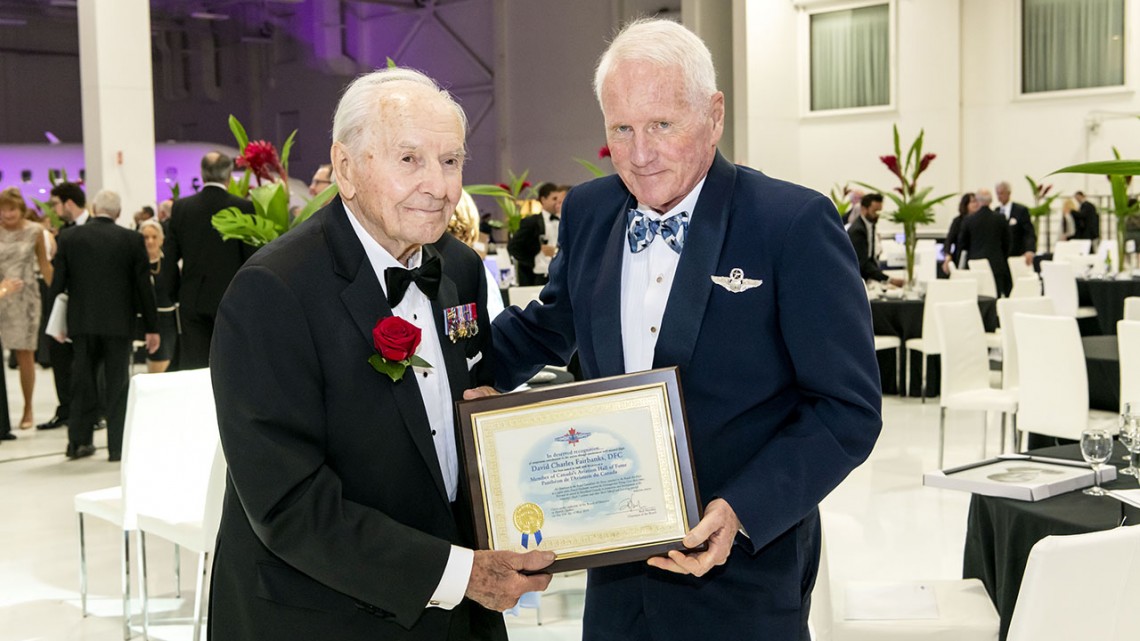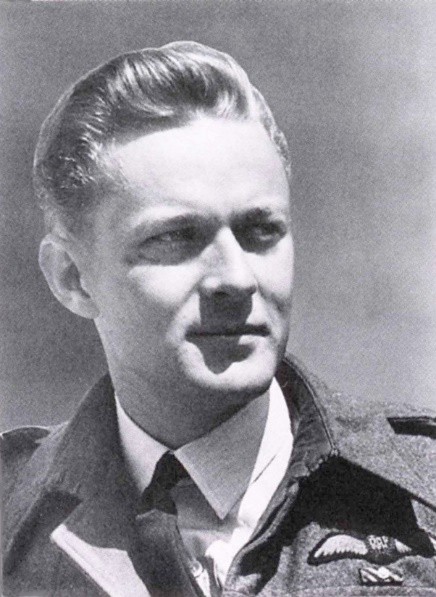
U.S. Air Force Maj. Gen. Michael Hall (Ret.) ’68, right, accepts the certificate enshrining David Charles Fairbanks ’50 into the Canadian Aviation Hall of Fame from Russ Bannock, member and former chairman of the board of the hall of fame.
Alumnus inducted into Canadian Aviation Hall of Fame
By Joe Wilensky
Cornell graduate David Charles Fairbanks ’50 was posthumously inducted into Canada’s Aviation Hall of Fame earlier this month.
U.S. Air Force Maj. Gen. Michael Hall (Ret.) ’68, a 27-year Air Force veteran and current director of the Ithaca Tompkins Regional Airport, was invited to attend the May 16 ceremony and, along with members of Canada’s aviation community, accepted the award on behalf of Fairbanks, who has no known descendants. Four other Canadian aviators also were enshrined at the hall of fame’s 46th annual ceremony.
“The event was magical,” Hall said. “If you haven’t been to a hall of fame induction, they are very reverent but joyful events – you’re in the company of people who have achieved great things in aviation.”
Fairbanks was born and raised in Ithaca; his father was Cornell agricultural engineering professor Frank Fairbanks (Class of 1910).
After graduating from Ithaca High School, David Fairbanks enrolled at Cornell as an engineering student, but left home in early 1941 to enlist in the Royal Canadian Air Force, earning his pilot’s wings late that year.
He served first as a flight instructor in Ontario and Quebec before being posted in the United Kingdom in 1943 during World War II. He built a legendary reputation there, flying the Hawker Tempest fighter and commanding the No. 274 Squadron, Royal Air Force, achieving 15 victories before being shot down just before VE-Day and spending the war’s final two months in a German prison camp.
Fairbanks was awarded the Distinguished Flying Cross three times.
After the war, he finished his mechanical engineering degree at Cornell and then returned to Canada, where he worked as an engineer and technician and joined the Royal Canadian Air Force Auxiliary. He became a test pilot for de Havilland Aircraft of Canada in 1955 and, while there, he contributed to the development and market success of that company’s STOL (short take-off and landing) technology products, including its DHC-7 turboprop airliner (commonly known as the Dash 7). He served as de Havilland’s manager of flight operations for 20 years while also serving as a demonstration pilot at major world air shows.
Fairbanks died in 1975 at age 52. The following year, in recognition of his accomplishments on the evolution of the Canadian aviation industry, he was posthumously awarded the Trans-Canada (McKee) Trophy, Canada’s oldest aviation award.
“As a pilot, Dave was an artist, the airplane was his brush and the sky his canvas,” said Tom Appleton, immediate past chairman of Canada’s Aviation Hall of Fame, who Fairbanks trained as a test pilot and worked with in the late 1960s and early ’70s. “He had a deft touch with hands and feet and the ability to place an aircraft in front of an audience at the best angle, showing it off to advantage to draw attention without abusing its limits.”
Hall said he had not known about Fairbanks and his legacy before being invited to participate in the ceremony, which was held at the Pierre Elliott Trudeau International Airport in Montreal. Canada’s Aviation Hall of Fame is located in the Reynolds-Alberta Museum in Wetaskiwin, Alberta.
“To learn about David Fairbanks, his connections to Ithaca and Cornell, and to be there and meet people who had known him and served with him, and to hear more about his character and accomplishments, was a real honor,” Hall said.
Hall also plans to work with The History Center in Tompkins County to include an exhibit about Fairbanks to be displayed at the airport this fall.
Fairbanks is not the only Cornell alumnus in Canada’s Aviation Hall of Fame – Wallace Rupert Turnbull, Class of 1893, a famed Canadian aeronautical engineer and inventor, also is a member.
Media Contact
Get Cornell news delivered right to your inbox.
Subscribe


